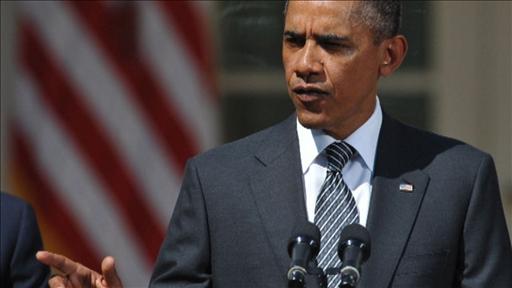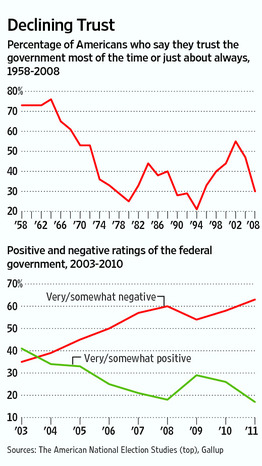In Government We Mistrust
Obama said he'd be Reagan in reverse. He was right.
WSJ.com
One animating theme of Barack Obama's campaign
and early Presidency was that he would repair
government's post-Reagan reputation, expanding its
role in American life so voters would turn once
again to Democrats as the party of government, as
they did in 1964 and the 1930s. So how's that
working out?
Not so well, judging by a remarkable Gallup poll this week that asked the public about its views of government and various businesses. The federal government dropped to its lowest approval levels ever. Only 17% were positive, 63% negative, for a net approval rating of minus-46%. Government never ranks well, but for the first time since Gallup began asking in 2003 it fell to last place—below even the oil and gas industry, which netted minus-44% approval.
Gallup didn't inquire about millionaires and billionaires and corporate jet owners, though perhaps they're not the best foil for Mr. Obama either.
In fact, as shown in the bottom chart nearby, the public's hostility to government has climbed to all-time highs under President Obama's tenure. A plurality had a very or somewhat positive view as recently as 2003—41% versus 35%. Dissatisfaction climbed over President Bush's second term amid an unpopular war and tapped-out GOP, then fell slightly on public hopes for Mr. Obama as he took office in 2009. This annual survey is conducted in August, so it may have missed the worst of the public's reaction to the autumn 2008 panic on Wall Street and Capitol Hill. Yet today, negative views are higher, and positive views are lower, than ever before.
Gallup is hardly an outlier. In a mid-August Washington Post poll, merely 21% was satisfied with "the way this country's political system is working," down from 38% in 2009. Some 78% were dissatisfied, up from 61% in the 2009 poll and 64% in 2007. The Pew Research Center also reported last month that only 22% of the public is "basically content" with the federal government, by far the lowest share since the survey began in 1997.
All this is a striking rebuke to the President who rode into Washington planning to rehabilitate the country's confidence in government as a means of advancing entitlements and transfer programs. As Mr. Obama mused during the primaries, he envisioned himself as Ronald Reagan in reverse, making the case that government is the solution and not the problem. His 2009 health-care speech to Congress ended with a soaring peroration about "the perils of too little" government.
Liberals claimed one political age was giving way to another of activist government, with the Reagan era as the aberration. "For the first time since the Johnson Administration," George Packer wrote in the New Yorker, "the idea that government should take bold action to create equal opportunity for all citizens doesn't have to explain itself in a defensive mumble. That idea is ascendant in 2008 because it answers the times."
So why have the times apparently changed again, and so fast? The public's falling confidence in government is no doubt partly due to the economy and joblessness, and some of it, too, to the debt-ceiling fracas. But it also reflects the historical pattern of modern American politics: Every time Democrats attempt to govern the country from the ideological left, they damage government's reputation and status.
The top chart shows the share of Americans who say they trust Washington to do the right thing sometimes or always, which is a standard survey question to gauge the government's credibility as an institution. The data come from the American National Election Studies poll, conducted by Stanford and the University of Michigan and considered by political scientists the most rigorous method for tracking U.S. opinion over time.
Mid-century trust in the government reached an all-time high of 78%, in the glow of World War II victory. But it started to plunge in the latter half of the 1960s, as the Great Society and Vietnam ended the Kennedy boom. It continued to fall with Watergate but dipped deeper thereafter, as Congress dragged Jimmy Carter to the left and liberals had no answer for stagflation and malaise.
One irony is that trust rebounded when the Gipper, the supposed enemy of all government, turned around the economy and nudged the government toward doing fewer things well, rather than many things poorly. Reagan's reform efforts waned, however, and government esteem fell to its lowest point (21%) after Bill Clinton's first two years, whose tax increases and HillaryCare bequeathed the Gingrich Congress.
The perception of government climbed again as Mr. Clinton tacked to the center, the economy improved, and Congress passed by far the most successful government reform of modern times—welfare reform, which ended the federal entitlement and gave states more authority. The American National Election Studies data for 2010 aren't yet available, though the election results suggest it wasn't a great year for the feds.
The lesson is that public trust in government is highest when Washington is retreating from the broad spending, tax and regulatory agenda that prevailed in the late 1960s, 1970s, early 1990s and now today. Mr. Obama promised prosperity that his government model never has and can't deliver and thus is discrediting government itself. He may well turn out to be Reagan in reverse, if not in the way he imagined.



